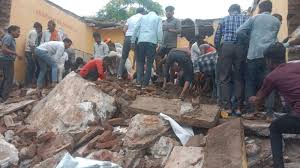Deaths in school: On the state of government schools
Infrastructure of government schools need urgent attention
On July 25, 2025, tragedy awaited students of Classes 6 and 7 at the Piplodi Government School in Rajasthan’s Jhalawar district as they assembled for prayer. A part of their school building gave way leading to the deaths of seven and injuries to several others. Most of the students were from tribal communities. The school is in the southeastern part of the State bordering Madhya Pradesh. There was a similar incident the next day in Nagaur district but the school was closed being a holiday. There has been much public anger in the State over the incidents which, quite rightly, have thrown the spotlight on the state of government schools. As in UDISE 2023-24 data, there are more than 70,000 government schools in Rajasthan serving nearly 84 lakh students, especially from the poorer and marginalised sections. Of these, some 8,000 schools have been estimated by the Education Department to be in a poor condition. The Jhalawar school was not among the schools identified as being in a poor state, indicating the extent of the problems. Some ₹650 crore had been allocated in the past two State budgets for boosting the infrastructure but inefficiencies in government have ensured that the measures did not make much difference. Fixing the infrastructure of government schools should be a priority for the State’s Bharatiya Janata Party government.
The tragedy in Rajasthan should serve as a wake-up call across India, given the current policy defocus on government-owned education institutions. The National Education Policy (NEP) 2020 had called for an immediate increase in spending on education, from some 4.6% of GDP to 6%, identifying one-time spends on infrastructure as the lead priority besides identifying other sectors for a boost in support. Five years into the NEP, there is little to suggest that this has been a focus area for governments, Union or State. Policy thrusts have been more towards reducing government support, self-financing, and encouraging private sector contribution. While these may be applicable to higher education, basic school education is a primary duty of the government — as it is across the world including in the most developed nations. Setting up model schools and funding them to serve as exemplars cannot be at the cost of mass school education. Foundational Literacy and Numeracy has been identified as a critical area for boosting workforce productivity and reaping the demographic dividend that will soon run its course as India’s population ages. But the discourse on pathways towards achieving them is more on pedagogy, non-formal teaching and so on than the essentials — an infrastructure boost and teacher recruitment and training.
